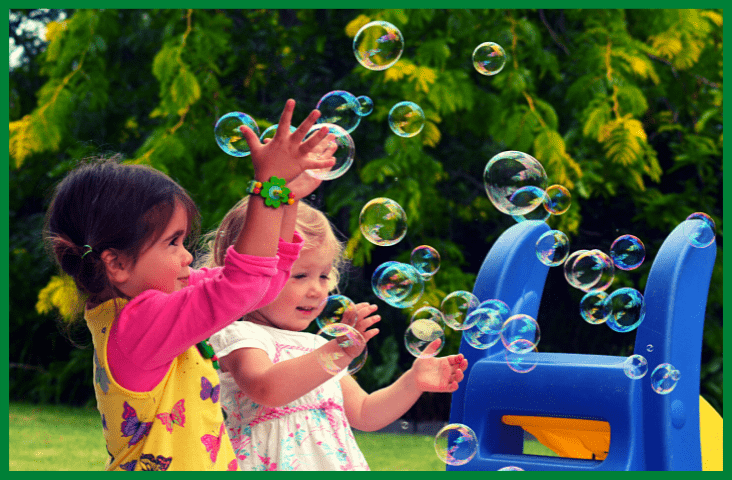
Why Play Is Important For The Developing Brain
It has been theorized for decades that play is a critical way to develop pathways in the brain essential for life-long learning. Now, living in the 21st Century, we have the privilege of being able to access scientific evidence of the developing brain that makes this theory concrete and measurable. Play is a wonderful way for children to develop critical skills such as regulation, conflict resolution, autonomy, independence and communication. Play actively releases chemicals in the brain that naturally stimulate and “open-up” the pathways in the brain that support children to better access their “thinking/learning brain”. (It works for adults too!)

The thinking/learning brain (the pre-frontal cortex) is the part of the brain responsible for:
- Decision making
- Reasoning
- Regulation
- Problem Solving
- Knowing right from wrong
- Planning (among other things).
The pre-frontal cortex is also the last part of the brain to be completely developed, and this doesn’t occur most often until around our mid 20’s. Developmentally, this means that children will biologically have much more difficulty accessing their “thinking/learning brain” than an adult with a fully developed thinking brain. You can think of it like paving a new road where there has been no road prior– the pathways in the brain, linking the thinking brain to the rest of the brain are literally “still under construction” (picture flashing signs and lots of roadblocks!). This means that children will find it increasingly challenging under high pressure, big emotion or stress to “keep their thinking brain online”. That road in a child’s brain is just a little more bumpy, making the ride that little more wobbly at times! Just as adults with completely developed thinking brains we might “act out of character” when under pressure or “forget our pin number when we are really stressed”, the underdeveloped thinking brain in a child is going to struggle even more so.


So as parents, what might this look like in the home?
- First of all, unstructured time to play and explore is critical for all areas of a child’s development. We must prioritize and support time for children to play!
- If your child wakes up on the “wrong side of the bed”, gently encourage them to read a story with you, or put on some music and dance or get out some Lego and play together. (This connection as well as opportunity for play releases the right chemicals the brain needs to “feel better”, opening up a child’s pre-frontal cortex, enabling them to better regulate and process how they feel).
- When children get home from Kindy (or school) and they are tired and emotional and refusing to “do anything”, encourage them to go outside onto the swing or trampoline, or play a game over some snacks (then tackle the afternoon tasks once that play has re-engaged everyone’s “thinking brain”).

- Find time each day to spend 10 minutes connecting through play with your child while throwing a ball, playing hide and seek, doing a drawing (or another play activity of their choice).
- After a particularly busy week with lots of rush and appointments, attempt to prioritize additional unstructured play over the weekend (to support your child to better regulate their emotions and process the overload of the week).
- For school-aged children, before they sit down to complete schoolwork/homework etc, play a board game, get them outside in the sunshine or encourage them to do some drawing or box construction (sticky tape, boxes, and scissors are a wonderful mindful, yet playful activity!).
Play literally primes the thinking/learning brain so that children can access the part of their brain that is needed for them to regulate emotions, focus, plan, and problem solve. The more children have access to ample time to play, the more pathways are laid down within the brain, further supporting critical skills for learning and development. These skills are not only critical for “academic learning”, they are critical for all areas of a child’s development, impacting who they are and how they navigate the world around them.
Neuroscience is widening our knowledge and understanding of the developing brain more and more and as parents, educators, grandparents, therapists (etc), we must continue to advocate for each child’s right to play!
By Heidi Denner
Some additional resources:
- https://www.heysigmund.com/playful-parenting-better-brains-10-tools/
- https://www.heysigmund.com/creativity-in-children/
- https://monadelahooke.com/what-to-know-before-we-teach-children-self-regulation-skills/
Heidi Denner is a wife, mum and educator who is continually inspired by all she learns from the children she works with daily, (and in particular her own three children). As a mother to an autistic child, Heidi is an advocate for children’s needs, but also understands the significance of family mental health and wellbeing and how this is critical to a child’s overall development. As an avid reader and life-long learner regarding all things “neuroscience”, Heidi loves sharing current research regarding brain development so that families can understand how to best support their child’s needs and their own personal mental health and wellbeing.


